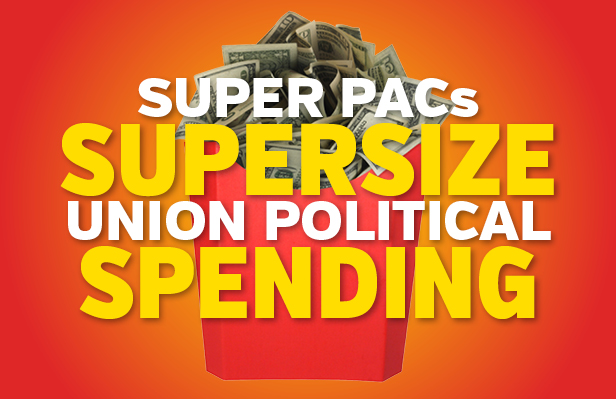Media

Government Unions’ Political Power Grows
Despite claims that union dues aren’t used for politics, the amount Pennsylvania’s five largest government unions reported spending from union dues on “political activities and lobbying” increased in 2013 to $5.5 million.
This is in addition to the $4.7 million collected for government union PACs (i.e., campaign contributions) using taxpayer resources during the last election cycle.
Our newest policy points on government unions’ political spending summarizes what unions report each year to the U.S. Department of Labor, including how much they spend on politics from dues along with contributions to other organizations. The analysis also gives several examples of how union dues are used for political action.
| Government Union Profiles, 2013 | |||||
| PSEA | AFSCME Council 13 | UFCW 1776 | SEIU Local 668 | PFT | |
| Members and Fee Payers | 186,578 | 61,201 | 20,618 | 19,752 | 30,916 |
| Total Revenue | $93,727,932 | $36,426,767 | $16,637,558 | $14,411,912 | $2,362,131 |
| Political Activity & Lobbying | $3,764,154 | $813,659 | $454,048 | $376,699 | $116,982 |
| Chief Executive | Michael Crossey | David Fillman | Wendell Young, IV | Kathy Jellison | Theodore Kirsch |
| CEO/Pres. Compensation | $223,850 | $205,210 | $292,765 | $101,571 | $172,806 |
| Regular Dues for Full Time Member | $489/year | 1.5% of salary | $16.97/week | 1.39% of salary | $10.30/month |
| Sources: Office of Labor-Management Standards, “Form LM-2 Labor Organization Annual Reports,” http://kcerds.dol-esa.gov/query/getOrgQry.do | |||||
On top of this, a recent court ruling will allow Pennsylvania union dues to go to “Super PACs.” As I wrote in a Forbes commentary, this will significanltly increase the political power of government unions.
The group that won the case, General Majority, spent $6 million in New Jersey last year—with about 3/4 of that coming from union dues. Their stated goal is inherently political and partisan: “We have to take back state legislatures that have been overrun by Republicans.”
Super PACs can’t give directly to candidates, but they can spend money on “independent expenditure” ads supporting or opposing candidates. This means they can take unlimited amounts of union dues to fund their “independent” political ads. For a more thorough explanation, the Pennsylvania Department of State has posted a notice on this ruling:
The PI [preliminary injunction] order allows a political committee that is properly registered with the Department of State (as required by the Pennsylvania Election Code) to accept contributions from corporations, unincorporated associations and/or labor unions, so long as that registered political committee does not make contributions to, or coordinate expenditures on behalf of, candidates or political committees controlled by political parties.
Amazingly, some union leaders continue to lie to their members by saying union dues aren’t used for politics.